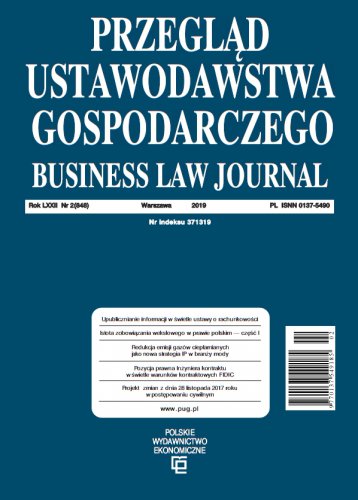Smart contract – how to present the evidence in the Polish civil procedure?
Smart kontrakt – jak przeprowadzić dowód w polskim procesie cywilnym?
Transactions based on smart contracts are becoming increasingly common, which will eventually lead to situations where it will be necessary to provide evidence from a smart contract in civil disputes. The aim of the article is to indicate how to conduct evidence with a smart contract and attempt to identify problems that the court will have to face. Due to the fact that the provisions of the Code of Civil Procedure do not mention it among the specifically regulated means of evidence, there will be a need for its qualification. Undoubtedly, in the light of the definition from Article 77(3) of the Civil Code, a smart contract can be recognized as a document. However, in terms of procedural law, such evidence will have to be conducted based on Article 308 or Article 309 of the Code of Civil Procedure. The court conducting the evidentiary proceedings will have to specify the method of conducting evidence from a smart contract. This should be done by appropriately applying the provisions regulating evidence from a document or the provisions regulating evidence from an inspection. It seems that there is no need for another amendment of the provisions of the Code of Civil Procedure, and appropriate interpretation of existing provisions will suffice.
Transakcje oparte na smart kontraktach są coraz powszechniejsze, co w konsekwencji doprowadzi do sytuacji, że w sporach cywilnych będzie istniała konieczność prowadzenia dowodu ze smart kontraktów. Celem artykułu jest wskazanie, w jaki sposób przeprowadzić dowód ze smart kontraktu, oraz próba wskazania problemów, z jakimi będzie musiał zmierzyć się sąd. Z uwagi na okoliczność, że przepisy Kodeksu postępowania cywilnego nie wymieniają go pośród szczegółowo uregulowanych środków dowodowych, zajdzie konieczność jego kwalifikacji. Niewątpliwie w świetle definicji z art. 77(3) Kodeksu cywilnego smart kontrakt może być uznany za dokument. Jednakże na płaszczyźnie procesowej dowód taki będzie trzeba prowadzić na podstawie art. 308 lub art. 309 Kodeksu postępowania cywilnego. Sąd, który będzie prowadził postępowanie dowodowe, będzie musiał określić sposób przeprowadzenia dowodu ze smart kontraktu. Powinno to nastąpić przez odpowiednie zastosowanie przepisów regulujących dowód z dokumentu lub przepisów regulujących dowód z oględzin. Wydaje się, że nie ma potrzeby dokonywania kolejnej nowelizacji przepisów Kodeksu postępowania cywilnego, a wystarczająca będzie odpowiednia wykładnia istniejących przepisów.
Bibliografia
Becker, A. (2004). Elektronische Dokumente als Beweismittel im Zivilprozess. Peter Lang Verlag.
Ereciński, T. (1985). Z problematyki dowodu z dokumentu w sądowym postępowaniu cywilnym. In: Studia z prawa postępowania cywilnego. Księga pamiątkowa ku czci Z. Resicha. Państwowe Wydawnictwa Naukowe.
Flaga-Gieruszyńska, K. (2019). Środki dowodowe i postępowanie dowodowe w nowelizacji Kodeksu postępowania cywilnego z 4.07.2019 r. Palestra, (11–12).
Gromova, A. (2018). Smart contracts in Russia: An attempt to define the legal nature of smart contracts. Law and Digital Economy, (2).
Hansen, H. R. (1998). Wirtschaftsinformatik I. Grundlagen betrieblicher Informationsverarbeitung. Lucius & Lucius.
Hazard, J., & Happio, H. (2017). Wise Contracts: Smart Contracts That Work for People and Machines. Social Science Research Network.
Kaczmarek-Templin, B. (2012). Dowód z dokumentu elektronicznego. C.H.Beck.
Kaczmarek-Templin, B. (2016). Dane elektroniczne a dowód z opinii biegłego w postępowaniu cywilnym – zarys problemu. In: Ł. Błaszczak, & K. Markiewicz (Eds.), Rola biegłego w postępowaniach sądowych. Presscom.
Kaczmarek-Templin B. (2021). In: Ł. Błaszczak (Ed.), Dowody w postępowaniu cywilnym. System Postępowania Cywilnego. Vol. 2. C.H.Beck.
Kaczmarek-Templin, B. (2022). Jeszcze raz na temat anonimu. Palestra, (7–8).
Kasatkina, M. (2021). The interpretation of smart contract in the EU and the USA. International Comperative Jurisprudence, 7(2). https://doi.org/10.13165/j.icj.2021.12.007
Kolvart, M., Margus, P., & Rull, A. (2016). Smart contracts. In: T. Kerikmae, & A. Rull (Eds.), The Future of Law and eTechnologies. Springer. https://doi.org/10.1007/978-3-319-26896-5
Kurth, W. (2001). IT-Grundlagenwissen: für Datenschutz- und Sicherheitsbeauftragte in Wirtschaft und Verwaltung. Frechen Königsdorf.
Kübler, P. (1999). Rechtsschutz von Datenbanken (EU–USA–Schweiz). Schulthess Verlag.
Okoń, Z. (2010). Modyfikacja i opracowanie programu komputerowego w polskim prawie autorskim. Zeszyty Naukowe Uniwersytetu Jagiellońskiego. Prace z Prawa Własności Intelektualnej, (4).
Papantoniou, A. (2020) Smart contracts in the new era of contract law. Digital Law Journal, 1(4). https://doi.org/10.38044/2686-9136-2020-1-4-8-24
Piech, K. (2018). Leksykon pojęć na temat technologii blockchain i kryptowalut. https://www.gov.pl/documents/31305/0/leksykon%20pojec%20na%20temat%20technologii%20blockchain%20i%20kryptowalut.pdf/77392774-1180-79ab-4dd5-089ffab37602 (access: 10.04.2023).
Pecyna, M., & Behan, A. (2020). Smart contracts – nowa technologia prawa umów? Transformacje Prawa Prywatnego, (3).
Perugini, M. L., & Checco, P. D. (2015). Smart contracts: A preliminary evaluation. https://papers.ssrn.com/sol3/papers.cfm?abstract_id=2729548 (access 10.04.2023).
Raskin, M. (2017). The law and the legality of smart contracts. Georgetown Law Technology Review, 1–2.
Sadomski, J. (2019). In: T. Szanciło (Ed.), Kodeks postępowania cywilnego. Komentarz. Art. 1–50539. Vol. I. C.H.Beck.
Saveleyev, A. (2017). Contract Law 2.0: "Smart" contracts as the beginning of the end of classic contract law. Higher School of Economics Research Paper No. WP BRP 71/LAW/2016. https://papers.ssrn.com/sol3/papers.cfm?abstract_id=2885241 (access 10.04.2023).
Szabo, N. (1997). Smart Contract: Formalizing and Securing Relationships on Public Networks. First Monday, 2(9). https://doi.org/10.5210/fm.v2i9.548
Szostek, D. (2018). Blockchain a prawo. C.H.Beck.
Volos, A. (2021). Concept of smart contract within the framework of implementing the principles of the civil law. https://www.researchgate.net/profile/Aleksei-Volos-2/publication/350313277_Concept_of_Smart_Contract_within_the_Framework_of_Implementing_the_Principles_of_the_Civil_Law/links/6059a824299bf1736760f680/Concept-of-Smart-Contract-within-the-Framework-of-Implementing-the-Principles-of-the-Civil-Law.pdf (access 10.04.2023).
Werbach, K., & Cornell, N. (2017). Contracts ex machina. Duke Law Journal, 67(2).
Zöller, R., & Greger, R. (2004). ZPO Kommentar. Dr Otto Schmidt, remarks to § 371.
Legal acts/Akty prawne
Code of Civil Procedure – Act of 17.11.1964, consolidated text with amendments, Journal of Laws 2021, item 1805.
Cicil Code – Act of 23.04.1964, consolidated text with amendments, Journal of Laws 2022, item 1360.
Act of 10.07.2015 amending the Civil Code, the Code of Civil Procedure, and certain other laws, which came into force on 8.09.2016, Journal of Laws 2015, item 1311.
Act of 4.02.1994 on copyright and related rights, consolidated text of the act of 28.10.2022, Journal of Laws 2022, item 2509.
Websites/Strony internetowe
https://sjp.pwn.pl/slowniki/prawdziwość.html (access 10.04.2023).
https://wsjp.pl/haslo/podglad/3524/prawdziwosc/5155912/podpisu (access 10.04.2023).

